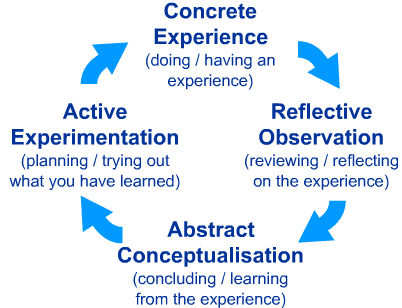Bear with me 🙂
After looking at the learning cycle last week I’ve stumbled across the wikipedia page for Learning Styles (en.wikipedia.org/wiki/Learning_styles) and done some reading but I’m hardly an expert so the following discussion may already have been covered by someone elses model and I just haven’t found it yet.
The issue is that I feel like the Kolb et. al. model is missing something.
When I’m learning there are two other elements that are important. The first is the environment, not just the physical space I’m in (although that definitely plays a part) but also the mental space. If I’m pressed for time, or I’ve just screwed something up badly and I know it and just want to get on with fixing the problem then I’m not in the right headspace to reflect, or to try anything new and as such, I don’t learn.
Which brings me to my second element. The Person the other bit of the learning process and the example above is a classic one for me. When things are going well I don’t reflect, I just get on with it (a little bit of “if it ain’t broke, don’t fix it”) alternatively, when things go pear-shaped then run the risk of not learning either because I’m so busy firefighting that reflecting is passed over in favor of just fixing the problem. So I hypothesize that the other part of the learning equation is being self-aware enough to look at the situation and say:
1. What can I learn here?
2. Am I actually ready to learn? (right frame of mind, right environment)
Figure 1: A Modified version of the Kolb Learning Cycle
The emphasis on self-awareness, in what we’ve covered so far, leads me to believe that it’s one of the most critical thinking functions we’re going to be expected to develop. Talking to people who are post-MBA about the models (Career Leader or the Belbin Team Roles) the point that they’ve reached is that they can look at a group of people, work out where others fit and then fill the roles around them (Chair, Shaper, Finisher etc.) to get the best performance for the team.
Framing the environment and an awareness of self are critical to my learning process and it seems reasonable to extend this model to include them. Thoughts?

